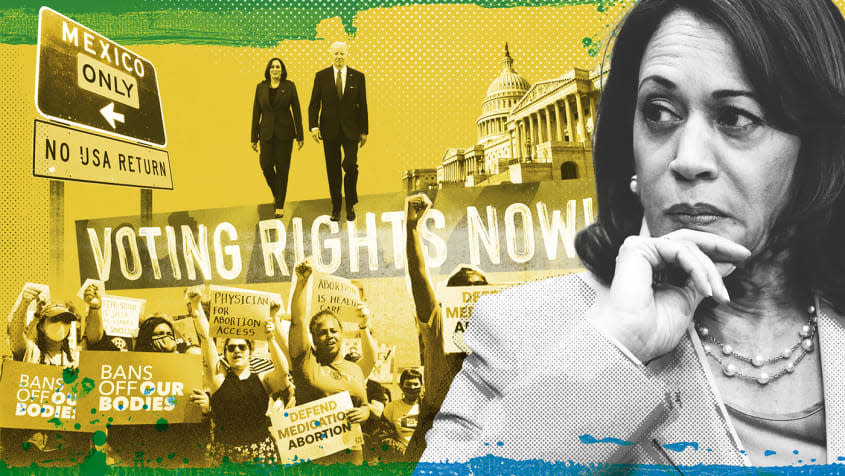What has Kamala Harris done as vice president?

President Biden officially launched his bid for re-election on April 25. The video announcing his run featured Vice President Kamala Harris heavily, confirming that she'll be running beside him again despite her lackluster approval ratings, and criticisms over how she has defined her role so far.
SEE MORE Is Kamala Harris an asset or liability for Democrats in 2024?
SEE MORE What has Biden done as president?
As they head into 2024, the Biden-Harris team is "rushing to the aid" of the VP to "try to shore up her underwhelming poll numbers," Axios says. Her approval numbers are "even worse" than those of her running mate, and officials fear that "could make her a drag on the ticket as Biden begins a re-election campaign that likely will boil down to a few tight states."
It's not uncommon for the second-in-command to struggle to prove themselves in a role largely defined by behind-the-scenes work. Harris' "critics and detractors alike acknowledge that the vice presidency is intended to be a supporting role," The New York Times writes, "and many of her predecessors have labored to make themselves relevant, as well." Still, those wary of Biden's age are putting more intense scrutiny on what the vice president has been up to. She has taken the lead on several critical contentious issues while Biden focuses his efforts elsewhere.
Abortion rights
Abortion has become a central issue for Democrats following the Supreme Court's decision to overturn federal abortion rights. Harris spent much of the 2022 midterms appealing to voters with promises to prioritize and protect reproductive rights. Since Roe fell, she has "been subtly making herself the voice with a megaphone no one can ignore," writes Philip Elliot at Time, adding that Harris has met with lawmakers from at least 18 states to discuss the issue. As Biden was announcing his 2024 candidacy, Harris was giving a fiery speech at a reproductive freedom rally at her alma mater, Howard University. She blasted "extremist so-called leaders" for passing restrictive abortion bans.
She is in need of a serious reputation boost, "which explains why Harris has made abortion rights a central piece of her political identity," Elliot continues. After all, outrage over Roe V. Wade "powered Democratic candidates to unexpectedly strong showings in the midterm elections," and many believe Harris "played no small role in that accomplishment," Elliot says.
Immigration and the southern border
Biden tapped Harris in the early months of their term to spearhead efforts to address the crisis at the U.S.-Mexico border. It took her months to make her first and only visit to the area, and the delay elicited backlash from lawmakers on both sides. Her trip to Guatemala and Mexico was ultimately overshadowed by an interview with Lester Holt of NBC News "in which she awkwardly downplayed the urgency" of the visit, The Washington Post says. Since then, Harris has borne the brunt of the criticism from Republicans as the border crisis worsens; Texas Gov. Greg Abbott (R) sent multiple buses of asylum seekers from the border to the VP's home in protest.
After withstanding the intense backlash of her perceived inaction, Harris is still attempting to address the root causes of the immigration problem. Her Central America Forward initiative has "yielded more than $4.2 billion in private sector commitments" to support creating local jobs and other measures to slow the flow of mass migration, CNN reported earlier this year. Some experts have lauded Harris' ability to secure the investments "as her most visible action in the region to date but have cautioned about the durability of those investments over the long term," CNN added.
Harris still has an uphill battle ahead of her to reverse public opinion about her work, or lack thereof, on the border. In January, the Border Patrol union lambasted her lack of progress. "If you were given a job two years ago with the explicit goal of reducing illegal immigration, and then you sit around and do nothing while illegal immigration explodes to levels never seen before, you should be fired and replaced," the union tweeted.
Voting rights
Harris was also at the forefront of the administration's pursuit to codify voting rights protections. She pushed for Congress to pass the Freedom to Vote: John R. Lewis Act, which would have extended the protections of the 1965 Voting Rights Act and required federal approval for some local election law changes. The VP "dove into" the "chance to make her mark on a hugely important issue," Eugene Daniels writes at Politico. To further that goal, Harris "helped craft political coalitions with civil rights leaders, built outside pressure on Congress, and engaged privately with lawmakers." Ultimately, her work "hit a brick wall" when Sen. Joe Manchin (D-W.Va.) and now-independent Sen. Krysten Sinema (Ariz.) rejected proposed changes to Senate procedures to stop a Republican filibuster.
Harris's work leading up to the stalled legislation became "a microcosm of her stint as vice president: one defined by sharp moments, mishaps, public drama, private work, and a touch of bad political luck," Daniels adds.
What's next for Harris?
The vice president's political skills "will be put to the test" as the president runs for re-election, says Chris Megerian at The Associated Press. While the second-in-command is "rarely decisive in re-election efforts, Harris is poised to be an exception," especially because she's already leading the charge on abortion, "Democrats' most potent issue." As Biden ages, she'll face hightened "scrutiny over whether she's ready to step into the top job if necessary," Megerian adds.
With such high stakes, "Biden needs to make the case to his party — and, more important, to independents and moderate Republicans — why Harris is the best choice to succeed him," Thomas Friedman opines at The New York Times. "At the same time, Harris has to make the case for herself, ideally by showing more forcefully what she can do."
